- Home
- Winston Groom
The Allies Page 2
The Allies Read online
Page 2
Winston traveled to Harrow accompanied not by his parents but by one of the Thomson sisters from Brighton. Winston had boned up on questions likely to be asked on the entrance exams, but he panicked and nearly failed, leaving him as “the class dunce,” to be ridiculed by his fellow students. Altogether it was not a promising start.
Winston wasn’t happy at Harrow. For one thing he had to “fag” for the upperclassmen. Much like a pledge in a fraternity, he was required to shine the shoes of his “betters,” run errands, and serve as a general flunky. He had trouble with his studies, particularly ancient languages, for which he found he had no natural gift. He also discovered for the first time that not being rich—as so many of his aristocratic classmates were—was a distinct disadvantage. And, once again, the parents he idolized were entirely absent.
In 1887 a calamity struck the Churchill family. Randolph, who had seemed poised to become the next prime minister of Great Britain, suddenly found all his prospects collapsed. It was his own undoing. As chancellor of the Exchequer he had objected to an item on military funding in the budget that had been submitted by the prime minister. When his objection was overruled, he impulsively wrote a letter of resignation, assuming that Lord Salisbury, the PM, would refuse to accept it. But Churchill had overplayed his hand. Salisbury was in no mood to brook insolence from one of his own Conservative Party members. The prime minister removed Churchill not only from the Exchequer but also from his position as leader of the House of Commons. He still retained his seat in the House, but he had lost his well-paying job as the nation’s treasurer and would never regain it, nor any other important post. It was a crushing social blow as well, as many erstwhile friends lost interest in a man who had destroyed a promising career. Winston was still too young to understand the implications of this event, and the name of Churchill remained a household word throughout Great Britain. But as the years went by his comprehension of what his father had done began to haunt him.
After his first two years at Harrow, Winston was directed into the school’s Army Class, which aimed at preparing students to enter Sandhurst, England’s version of West Point. One day, while he was at home on holiday arranging his fifteen-hundred-man army of toy soldiers, his father paid one of his rare visits to Winston’s quarters. Observing the precise formation of every infantry regiment, cavalry squadron, and artillery battery, his father asked him, “Do you want to go into the army?” Churchill immediately answered in the affirmative, and for years he believed that it was his toy soldiers that had prompted the question. Unfortunately, he found out later, it had been proposed because his father did not think he was smart enough to go to law school.
It took him three tries to pass the entrance examination to Sandhurst, which required proficiency in English, math, and Latin, among other subjects. The math and Latin threw him, but at length, and by dint of a terrific personal effort, he mastered mathematics and was accepted into the academy as a cavalry cadet. Churchill was delighted with himself when he wrote to his father about “what fun it would be having a horse,” and also that “the uniforms of the cavalry were much more magnificent than those of the Foot.”
Imagine then his shock to receive the following reply: “My dear Winston, I am rather surprised at your tone of exultation over your inclusion in the Sandhurst list.”8
This was the nicest thing in the entire letter, and it was a long one.
Lord Randolph branded Winston’s failure to get into the more competitive infantry “discreditable,” further evidence of the “slovenly, happy-go-lucky, harum-scarum style of work that has always distinguished you at your different schools.” His fury unabated, the elder Churchill ranted, “Never have I received a really good report on your conduct in your work.” In page after page the letter goes on, beyond chiding, to recite young Winston’s deficiencies of character and scholarship, concluding, “You need not trouble yourself to write any answer…because I no longer attach the slightest weight to anything you may say about your own acquirements and exploits.” He even threatened to cut off his son financially if he failed at Sandhurst. Not the least of Lord Randolph’s complaints was that Winston’s going into the cavalry would “impose on me an extra £200 a year” (about $25,000 in today’s dollars) for horses, servants, fancy uniforms, and equipment—which seems to be what the whole argument was about in the first place.9
What went through Winston’s mind when he received this screed is not recorded. But the day it came, he wrote back to his father, “I am very sorry that you are displeased with me,” promising that he would make it up at Sandhurst by hard work and good conduct. He signed it, “Ever your loving son, Winston Churchill.”10
* * *
DURING HIS YEARS AT the Royal Military Academy, Churchill for the first time began to find himself. He took his studies seriously, including tactics, fortification, topography, military law, and military administration. His enthusiasm grew, although for the first months during drill he was “placed in the awkward squad,” for “smartening up.”11
As a prospective cavalryman, Winston became enthralled with horses and spent his military leaves and vacations in riding school at the Knightsbridge barracks of the Royal Horse Guards. Here also Churchill mended fences with his father when he acquired what he called the status of a “gentleman cadet.” On leaves in London, he and his father visited the Empire theater, a kind of circus and vaudeville establishment. More important, his father took Cadet Churchill with him to important Conservative political parties and events, introducing him to prominent politicians and personally discussing with him the critical issues of the day. Even so, Churchill later wistfully wrote, every time he attempted a moment of true friendship, his father became offended and “froze.”
In December 1894 Winston Churchill graduated from the Royal Military Academy at Sandhurst with honors (eighth in his class of a hundred and fifty) and received the queen’s commission as a second lieutenant—or subaltern—in the British army. He had, as he said, “passed out into the world.”12 He was just twenty years old.
At that time, the imperial British army was composed of approximately 224,000 troops, most of them stationed halfway around the world. Threats from continental rivals such as France, Spain, or Holland had passed and danger from Germany was not yet apparent. The present job of the British army was to put down the frequent rebellions among the peoples of the empire that included nearly one-quarter of the human population of the earth. These were the nearly 500 million souls who composed—from Cape Town to Cairo, Bombay to Rangoon, Melbourne to Auckland, Khartoum to Dublin and the many points between—the mighty British Empire “upon which,” it was said, “the sun never sets.”
As Churchill entered Her Majesty’s Service, trouble had been brewing with the Boers in South Africa, the Dervishes of the Sudan, and the fierce, ruthless tribesmen of the Hindu Kush. He had written his younger brother, Jack, who was then attending Harrow, “There is no ambition I cherish so keenly as to gain a reputation for personal courage.” Over the next several years he’d have every opportunity to prove this—although in the process he earned the dubious reputation of a “medal chaser”*3 and “self-advertiser.”13 In this era, he appears more like a young man in a hurry, rather than a young man on the make, as he watched his father decline at a shockingly young age.
By the time Winston graduated from Sandhurst, the elder Churchill was experiencing the full effects of the illness that had been diagnosed as syphilis, including deterioration of the brain. Soon, as his son described it, the reporting of Randolph’s speeches in the Times dropped from three columns to two, then to one and a half, and finally to none.14
“Had he lived another four or five years he could not have done without me,” Churchill said. “But just as friendly relations were ripening…he vanished forever.” Lord Randolph was just forty-five years old at the time of his death, and Winston, who feared a similar fate, must have felt a nearly crushing pressure to succeed ear
ly in life.
He would not want for opportunity. In February 1895, Winston’s assignment came at last: the Fourth Hussars, an elite regiment of light cavalry often used as scouts. They were scheduled to be posted to India for at least the next decade, but Winston had no intention of staying with them all that time. Although he’d taken to army life and longed to prove himself in combat, he’d begun to see the military as a springboard for a political career—as illustrious, he hoped, as his late father’s, though with a better ending.
But first he needed to do something that would call attention to himself, enhance his reputation, and perhaps even gain him a promotion. When guerrillas under the well-known liberator José Martí*4 rebelled against Spain’s colonial army in Cuba, it presented a likely opportunity to further his goal. Through his mother’s (possibly romantic) connections, he sought and received from the Spanish government permission to accompany the Spanish army in Cuba as an “observer”; he also wrangled a spot as a war correspondent for the Daily Graphic at five guineas per letter (about $600 today), which would help him manage expenses. Having obtained leave from his regiment prior to its posting to India, Churchill soon found himself in the thick of battle on the tropical island.
Before he departed, in what must have been an absorbing experience to say the least, he took part in a champagne-fueled three-day whirlwind visit to his mother’s hometown of New York City. His host was a fabulous American Irishman named Bourke Cockran, a successful lawyer and Tammany politician, as well as another of Jennie’s paramours. Cockran put Churchill up in lavish style in his Fifth Avenue apartment and introduced the young British officer to all the right clubs. At one point he was received by Cornelius Vanderbilt, the railroad magnate; Vanderbilt’s niece Consuelo would one day marry Churchill’s cousin Charles “Sunny” Churchill—becoming, in the process, the latest Duchess of Marlborough.*5
After departing from Key West on a steamer, Churchill arrived in Havana on November 20, 1895. He soon found him self at the fighting front—such as it was—in a guerrilla war. The segment of the Spanish army to which he was attached had put itself on a lengthy weeklong march in hopes of being attacked by the enemy; they were rewarded with several grueling days of sniping and minor actions before anything rising to the dignity of a battle broke out.
Churchill found himself exhilarated at being under fire for the first time. Officers and men fell all around before the Spanish prevailed and the rebel firing slacked off. Churchill took it all in with gusto. Altogether he filed five letters for the Daily Graphic under the headline “The Insurrection in Cuba.” The Churchill biographer William Manchester notes: “They show a keen eye for detail, a gift for clarity, and a sure grasp of tactics.”
But if Churchill’s knowledge of tactics was firm, it was his notions of strategy that caused difficulties. He was condemned by newspapers on both sides of the Atlantic, apparently on the assumption that a mere second lieutenant in the British army had no right to comment on such weighty matters as how to proceed in a complex guerrilla war. He told the New York World that if the Spanish could take the towns of Matanzas and Santa Clara from the rebel forces before the rainy season, they would probably defeat the insurrection; if not, it might last another several years. The insurgents themselves, he added, were both unsoldierly and cowardly or, as Churchill put it, “well versed in the art of retreat.” Furthermore it was his opinion that the United States should intervene in the conflict. Remarks like these prompted American newspapers to say that Churchill’s presence in Cuba was proof that England was “throwing more bricks at the Monroe Doctrine.”15
In Great Britain some newspapers were likewise unkind, one sarcastically musing that “spending a holiday fighting other people’s battles is rather extraordinary, even for a Churchill.” Another prophesied that the head of the British army would “probably order him to return at once and report himself.”16
Manchester believes that Churchill’s British upbringing caused him to side with the Spanish, and that he would be biased against any colony that rebelled against its empire. “He had been, and in some respects always would be, a defender of established order. Imperialism would never be a pejorative for [Churchill],” Manchester observed.17 Later, however, Churchill would write: “I reproach myself somewhat for…having perhaps done injustice to the insurgents…I succeeded in making out a case for Spain…But I’m not sure it was right.”18
* * *
SOON CHURCHILL AND the other officers of the Hussars were aboard the SS Britannia, bound for Bangalore, India. During his six months of leave before departure, Churchill had used every bit of guile he possessed, as well as the not inconsiderable guile of his mother, to get out of the Indian assignment—but to no avail. Jennie had just returned from a nine-month romp in Europe, including a torrid affair with Bourke Cockran in her apartment on the Champs-Élysées. She was desperate for money so she borrowed £17,000 on her life insurance and rented a seven-story Georgian mansion near London’s Hyde Park.
From this base of operations, Churchill regularly sallied forth to the newspapers of Fleet Street, trying to finagle a war correspondent’s job. But there were no respectable wars going on at the time, even though there was some action in South Africa and things were heating up again in the Sudan, so all responses from the papers were negative. Churchill begged his mother to lean on her widespread contacts to secure him a position anywhere but “the tedious land of India.” But at length it became clear that there was nothing doing, so he packed up and left on September 11, 1896.19
A chance encounter would soon turn all of this around for Churchill, opening his world to new vistas and providing him with the advantage he needed to seek political office. The following summer marked Queen Victoria’s Diamond Jubilee, and the aristocrats in and around London began a months-long celebration leading up to the event. One of the most fashionable occasions was a weekend party at Deepdene, the estate of Churchill’s aunt Lily, the current Duchess of Marlborough, which she was hosting for His Royal Highness Prince Albert Edward. Among the other guests Churchill met an army general with the striking name Sir Bindon Blood, with whom he struck up an instant friendship.*6 By the time the weekend ended, Churchill had secured a promise from Blood that if the general were to get a field command in some exciting place, he would arrange for Lieutenant Churchill to be on his staff. Before long, young Churchill would take him at his word. But first India loomed.20
* * *
“THE WEATHER IS BEGINNING to get hot and the troop decks are awful,” Winston wrote to his mother as the ship passed through the Suez Canal into the Red Sea. The voyage took upwards of a month, and Churchill used most of this dead time to improve his chess game, winning the semifinals of a shipboard tournament. When the ship reached Bombay, it was anchored offshore and skiffs were used to ferry the officers ashore. It was here Churchill had the accident that dislocated his shoulder. Five-foot swells were rolling in from the Indian Ocean, and when the boat reached the long stone dock it was nearly awash with “dripping steps and iron rings for handholds.” Just as Churchill grasped a ring, the skiff suddenly dropped into a trough, jerking his right shoulder so hard it was dislocated.*721
At dawn the next morning the regiment boarded trains for the day-and-a-half trip to Bangalore. It was located on a plateau three thousand feet above sea level, where days were hot but nights were cool. The officers—even second lieutenants—lived “like princes,” Churchill said. For a moderate price in rupees he secured a butler, a dressing boy, and a groom for his horses. Churchill and two others rented a magnificent bungalow plastered pink and white with a red-tiled roof. Shaded verandas were studded with large rounded columns entwined with purple bougainvillea. The house sat in an enclosed two-acre garden of colorful plants and flowers.
It was around this time that Churchill began to feel a need for higher education. Even though the studies at English private schools were considerably more advanced and rigorous than those
in American private schools, they stopped at a point far beneath the education to be gleaned at such prestigious universities as Oxford and Cambridge. Back home in England, and to a lesser extent abroad in India, Churchill sometimes found himself embarrassed in conversations that turned toward the intellectual. He knew the arts of war and had a grasp of politics but found himself deficient in subjects such as history, philosophy, and economics as well as the rich literature of his own country.
Now, at the age of twenty-two, he was ready to learn. He asked his mother to send him books by the trunkful, and soon he plunged into the great set pieces of classical antiquity such as Gibbon’s History of the Decline and Fall of the Roman Empire and Macaulay’s Lays of Ancient Rome. He studied Plato and Socrates, as well as other philosophers. He read for four or five hours each day, tackling Darwin’s Origin of Species and Thomas Malthus’s Principle of Population. “It was a curious education,” he wrote much later. “First, because I approached it with an empty, hungry mind, and with fairly strong jaws, and what I bit I got…and secondly, because I had no one to tell me, ‘This is discredited.’ ”22
Other than reading, polo became Churchill’s most fervent avocation. After the early morning drills and maneuvers there was little to do in the heat of the day but wait for the 5 p.m. polo hour, which lasted until 8:30. One of his fellow officers wrote that “if you wanted to understand Churchill, you had to see him play polo.” Churchill would stay out of the pack, waiting, watching, this observer noted. Then, when he saw a chance at the ball, he would dash in—“neither deft nor graceful, but full of tearing physical energy, and skillful with it, too.”23

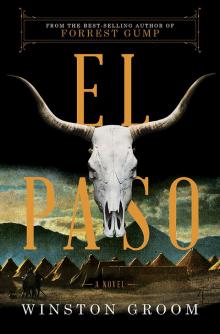 El Paso
El Paso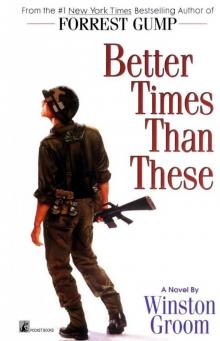 Better Times Than These
Better Times Than These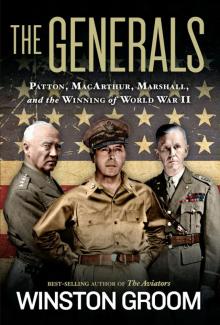 The Generals
The Generals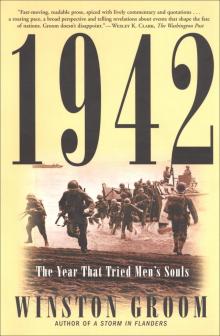 1942: The Year That Tried Men's Souls
1942: The Year That Tried Men's Souls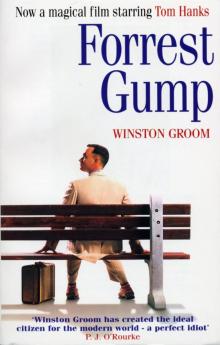 Forrest Gump
Forrest Gump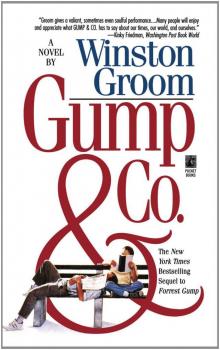 Gump and Co.
Gump and Co.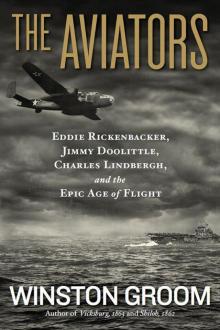 The Aviators
The Aviators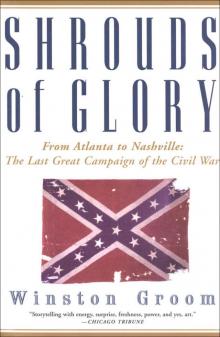 Shrouds of Glory
Shrouds of Glory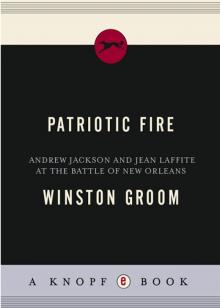 Patriotic Fire
Patriotic Fire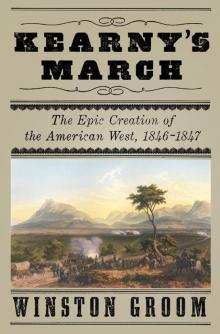 Kearny's March
Kearny's March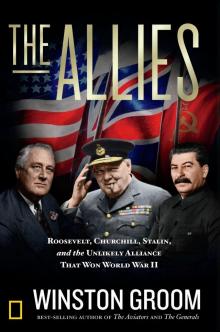 The Allies
The Allies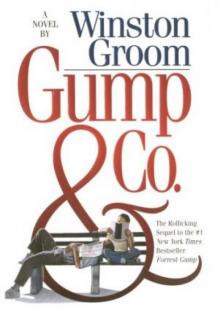 Gump & Company fg-2
Gump & Company fg-2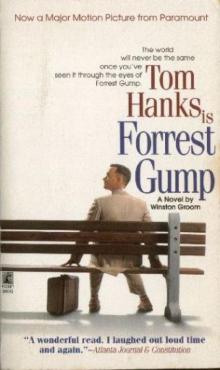 Forrest Gump fg-1
Forrest Gump fg-1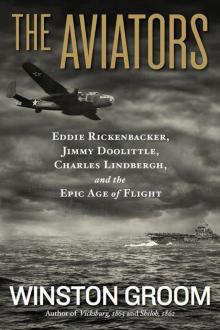 The Aviators: Eddie Rickenbacker, Jimmy Doolittle, Charles Lindbergh, and the Epic Age of Flight
The Aviators: Eddie Rickenbacker, Jimmy Doolittle, Charles Lindbergh, and the Epic Age of Flight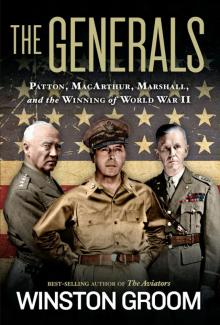 The Generals: Patton, MacArthur, Marshall, and the Winning of World War II
The Generals: Patton, MacArthur, Marshall, and the Winning of World War II